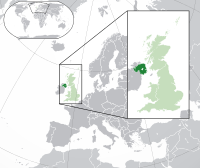
Photo from wikipedia
Abstract During the thirty-year period (1968–1998) known as the Troubles in Northern Ireland, 3500 people died and thousands more suffered physical disabilities and psychological trauma. Belfast, among other conflict cities,… Click to show full abstract
Abstract During the thirty-year period (1968–1998) known as the Troubles in Northern Ireland, 3500 people died and thousands more suffered physical disabilities and psychological trauma. Belfast, among other conflict cities, helped inspire the term ‘dark tourism’ in 1989. The country continues to be in conflict but is officially in a period of peace. Northern Ireland has been the theme for much peace and reconciliation research, but literature to date concentrates on polarised discourses rather than rural representation. Toward meeting and expanding the UN SDG16 peace goals, this research explores how what we term emotive peace tourism can be used as a methodology to affect emotional reconciliation registers in a unique rural Northern Ireland visitor experience. Bringing domestic tourists from Catholic and Protestant communities into face-to-face contact through a liminal participative ‘out-of-place’ visitor experience, we choreographed and performed a series of “Troubles” events: a guided night walk through a checkpoint, an IRA Wake, a UDA Funeral, and a Mixed-Marriage. Contributing to the debate as to whether tourism is more of a ‘peacekeeper’ than a ‘peacemaker’, our research demonstrates that an in situ liminal, emotive peace tourism experience, can generate sustainable tolerance, respect, trust, sympathy, and empathy towards others in post-conflict Northern Ireland and likely elsewhere.
Journal Title: Journal of Sustainable Tourism
Year Published: 2021
Link to full text (if available)
Share on Social Media: Sign Up to like & get
recommendations!